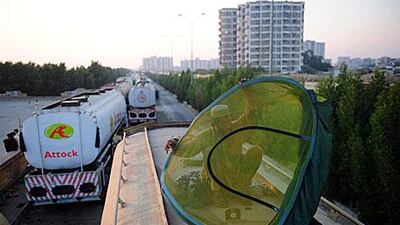KARACHI // Two months into Pakistan's blockade on Nato supplies crossing into Afghanistan, thousands of lorries are crowding the port in Karachi where drivers, fed up with waiting, are starting to desert.
For a month, directors of transport companies, drivers and their helpers hung around patiently, buoyed by rumours of an imminent reopening of the border, shut after US air strikes killed 24 Pakistani soldiers on November 26.
Two months on, Pakistan is still reviewing its relationship with the US and no one knows when the border will reopen, through which passes 25 per cent of the supplies needed by the 130,000 foreign troops under US command in Afghanistan.
Fed up, running out of money and missing their families, many of the drivers have abandoned their lorries and returned home.
"They had no more money in the end so they left one helper with their vehicle for security and care, and went back to their families," said Mohammed Saleh Afridi, vice chairman of the All Pakistan Oil Tankers Association.
He says more than a thousand lorries are stranded in Karachi. In addition, there are containers and military vehicles - about 5,000 according to a count provided by the authorities in early January.
Gul Khan, who has eight oil lorries supplying Nato, confirmed that drivers are leaving Karachi. "We're worried, we can be attacked," he said.
In 2008, attacks on lorries began to rise as Pakistani government forces became increasingly locked in trying to put down a Taliban insurgency and Al Qaeda-linked militants went on bombing rampages across the country.
Some drivers are happy about the blockade.
"If it closes down for good, that's all right. It's not a problem for us. At least we won't get abused," said Rozi Jan.
But other drivers, many of whom come from Pakistan's north-west tribal belt, desperately need the work.
"There are no jobs in our villages. Being a driver is the only solution to feed our families," said Mohammed Ayub, 33.

